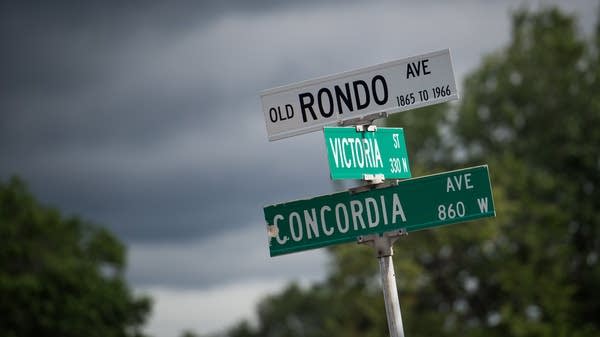A retracing of steps: Castile's funeral procession winds through historic Rondo neighborhood

Go Deeper.
Create an account or log in to save stories.
Like this?
Thanks for liking this story! We have added it to a list of your favorite stories.
The horse-drawn carriage that transported the body of Philando Castile to his funeral Thursday passed through what used to be the heart of St. Paul's black community.
Castile's procession was a symbolic retracing of steps: From the funeral home to the services and the picnic afterward, mourners of all races walked across familiar ground in the historic Rondo neighborhood.
In front of the Brooks Funeral Home, pallbearers lifted the gleaming white casket into the carriage. Someone placed a bouquet of about 60 red and white roses, a request from Castile's mother, Valerie.
And then there was the mile-plus walk to the Cathedral of St. Paul.
Turn Up Your Support
MPR News helps you turn down the noise and build shared understanding. Turn up your support for this public resource and keep trusted journalism accessible to all.
Several dozen mourners on foot — and a stream of vehicles behind — followed the horse and carriage down old Rondo Avenue, which used to be the neighborhood's main commercial spine.
Today, officially know as Concordia Avenue, it's an ordinary frontage road to Interstate 94. The old neighborhood's annual Rondo Days parade will trace part of that path, again, on Saturday.

As the funeral procession crawled down the street, a woman using her cellphone to videotape the sight from the sidewalk wiped away a tear.
"I didn't think I was going to get emotional," Mary Price said. "It's just sad."
Price didn't know Castile personally. But over the past week, she's learned a lot about the school cafeteria worker who made sure every child was fed.
Castile graduated from nearby Central High School. His grandfather owned a home in the area, on Dayton Avenue. Castile, who would have turned 33 on Saturday, was shot to death by a police officer last week during a traffic stop.
Price is 64, and like Castile, was raised in the area.
"It means a lot for them to have his casket come through the community," she said. "I was hoping it would do that, and I'm glad they did. I want to support this move as much as I can because a life has been taken unjustly."
Rondo, some longtime residents say, was also taken unjustly.

Before I-94 plowed through the neighborhood in the 1960s, it was the beating heart of St. Paul's African-American community. It was a place where black residents could own homes, go to church, run their own businesses.
Price was joined along the funeral route by her friend Oleatha Curtis. They stood beside a condominium complex where a corner store used to be. They still remember how the street was once chock-a-block with shops: A Piggly Wiggly at Kent and Rondo. Mr. Fields' drug store. Barber shops.
"Barber shops all up and down Rondo," Price said. "All that's gone."
When the highway came, it displaced some 650 families and split the community in half. It erased the wealth of some families and scattered the neighborhood's residents.
Curtis said African-Americans are still hurting. Her family lost their home to the freeway, too.
"We get messed up in every way possible there is," she said. "And it hurts. My neighborhood is not what it used to be."

LaTosha Mite, another neighbor who came out for the procession, said the whole community is hurt over Philando Castile's death. She sees echoes of Rondo in today's civil rights movement. In some ways, she said, our country hasn't changed enough.
"We're still marching. We're still singing the same songs that MLK sang in the '60s," she said. "When is this gonna stop? Or is this ever gonna stop? From the destruction of the neighborhood to today, our lives don't matter to a lot of people."
After Castile's funeral at the Cathedral of St. Paul, the carriage bearing his casket made its way back to the Brooks Funeral Home, one of the last few businesses on old Rondo Avenue. The family business has been burying Rondo's residents since 1941.
Margaret Brooks helps run the place. It's been in her husband's family for generations. Brooks said she thinks the outpouring of love in response to what happened to Castile marks a turning point in the nation.
"I'm a mother of five sons," she said. "That could have been one of my sons, my nephew, my husband."

Brooks took pride in handling the details on Thursday, securing those red and white roses that Castile's mom requested and making sure his body looked presentable.
"When you come into my funeral home, it's like coming to my home, I'm going to feed you, I'm going to help you," she said, tearing up. "It's the right thing to do."
Brooks swallowed her tears. But she has another tough day ahead of her that serves as a reminder of what a grim week it's been.
On Friday, she'll prepare another horse-drawn carriage, this one to carry the body of 2-year-old Le'Vonte Jones, shot and killed in Minneapolis last week, to his own funeral.



